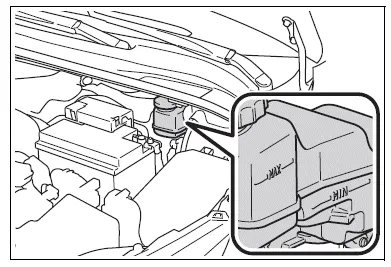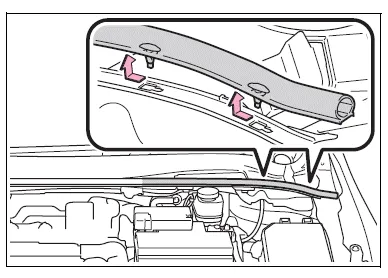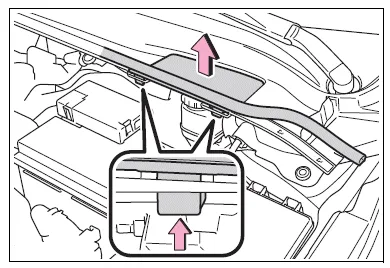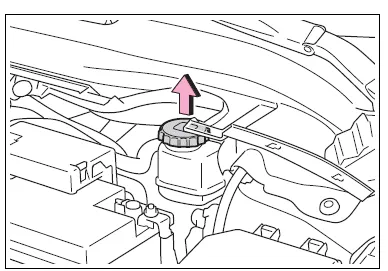Toyota Corolla (E210) 2019-2025 Owners Manual / Maintenance and care / Engine compartment / Checking and adding the
brake fluid
Toyota Corolla (E210): Checking and adding the brake fluid
■ Checking fluid level
The brake fluid level should be between the "MAX" and "MIN" lines on the tank.

■ Adding fluid
1. Slide and lift up the rubber strip to partly remove it as shown.

2. Disconnect the claws and remove the service cover.

3. Remove the reservoir cap.

4. Add brake fluid slowly while checking the fluid level.
Make sure to check the fluid type and prepare the necessary item.
- Fluid type
FMVSS No.116 DOT 3 or SAE J1703 brake fluid
FMVSS No.116 DOT 4 or SAE J1704 brake fluid
- Item
Clean funnel
■Brake fluid can absorb moisture from the air
Excess moisture in the brake fluid can cause a dangerous loss of braking efficiency. Use only newly opened brake fluid.
WARNING
■When filling the reservoir
Take care as brake fluid can harm your hands and eyes and damage painted surfaces.
If fluid gets on your hands or in your eyes, flush the affected area with clean water immediately.
If you still experience discomfort, see a doctor.
NOTICE
■If the fluid level is low or high
It is normal for the brake fluid level to go down slightly as the brake pads wear out or when the fluid level in the accumulator is high.
If the reservoir needs frequent refilling, there may be a serious problem.
Other materials:
Trunk
The trunk can be opened
using the trunk opener,
entry function or wireless
remote control or key.
WARNING
Observe the following precautions.
Failure to do so may result in
death or serious injury.
■Before driving
Make sure that the trunk lid is
fully closed. If the trunk lid is not
fully clos ...
PCS (Pre-Collision System)
The pre-collision system
uses sensors to detect
objects in the path
of the vehicle. When the
system determines that the
possibility of a frontal collision
with a detectable
object is high, a warning
operates to urge the driver
to take evasive action and
the potential brake pressure
is increased to h ...
Inspection procedure
1 Check security indicator light
Set the system in 30 seconds after filliping the security indicator to
check if the alarm is triggered.
2 Check glass breakage sensor ecu (glass breakage sensor)
Check the continuity and voltage of the glass breakage
sensor ecu, as shown in th ...


